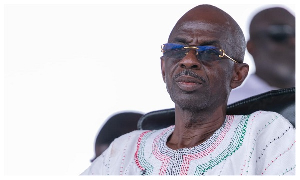“Outside there is singing, singing round a fire. It is Nkosi Sikelel’ iAfrika that they sing. God save Africa…Oh, lie quietly, little one”
Cry the Beloved Country.
Alan Paton
“Idiosyncracy and vicissitude had combined to stamp Sergeant Troy as an exceptional being”
Far From the Madding Crowd
Thomas Hardy
GOLD COAST BOY, the title of a book authored by Dr Kwame Addo – Kufour, described by Professor Mike Oquaye as “an illustrious Ghanaian whose life is worthy of emulation by young Ghanaians ….” is at once stimulating and enchanting.
It reminds those born before independence, their experiences in governance and their personal experiences in the ‘colonial days’, running through the struggle for independence and the eventual achievement of independence. These run in contrast with the experiences of those, like President John Dramani Mahama, who were begotten of their parents after independence.
In the Legislative Assemblies of the past, one could recall the ‘oratorical sagacity’ of the members. Fast forward to 2016 and on Thursday, 3rd March, the Speaker had drawn MPs’ attention to the need to use appropriate language and the avoidance of un-parliamentary language in the House.
When Kennedy Agyapong, Assin North MP told the house that he had received a letter from a school asking him to help pay school fees for some students of the school, another MP retorted that Kennedy Agyapong was a liar. The mention of the word ‘liar’ gored the speaker like a spear. In a tone, uncharacteristic of a Speaker, he railed at the Parliamentarians: “It is un-parliamentary to refer to a member on the floor that he is lying”.
Jenkin Lloyd has noted: “A speech is a solemn responsibility”, and to ensure the dignity of the august house, the members are expected to eschew insults, insinuation, epithets and allegations. The Speaker uses his discretion to determine what constitutes ‘un-parliamentary language’, and although Parliamentarians enjoy immunity from prosecution and civil action, words or phrases are expected to be so crafted as not to abuse this parliamentary immunity. Name – calling and insulting language do pose ethical problems in public speaking when they are used to silence opposing views.
. Sir Winston Churchill is rated as a master craftsman. A most notable speech he made in May, 1940 was: “I would say to the House, as I said to those who have joined this Government: ‘I have nothing to offer but blood, toil, tears, and sweat”. In November, 1942, he delivered a speech in which he stated coyly: “Now this is not the end. It is not even the beginning of the end. But it is, perhaps, the end of the beginning”.
When Nancy Astor, the first British MP told Sir Winston Churchill that: “If I were your wife I would put poison in your coffee”. Churchill retorted: “If I were your husband, I would drink it”. Churchill’s witticism did not end in Parliament. He told a priggish civil servant who objected to the use of prepositions at the end of sentences: “This is the kind of English up with which I will not put “. Churchill remarked after the second World War: “I could not live without Champagne. In victory I deserve it; in defeat I need it.” In the House of Commons in June, 1940, Winston Churchill addressed the House, after British and French armies had been routed by the Germans in Dunkirk: “We shall not flag or fail. we shall go on to the end … we shall defend our island, whatever the cost may be. We shall fight on the beaches, we shall fight on the landing – ground, we shall fight in the fields and in the streets, we shall fight in the hills. We shall never surrender!”
Ghanaian Parliamentarians enjoy freedom of speech and Alban Bagbin quotes Order 47 of the Standing Orders of Parliament and states that: “Proceedings of Parliament shall ordinarily be conducted in the English Language except that a member may exercise the option to address the house in Akan or Nzema, Ga, Ewe, Hausa, Dagbani, Dagari or any other local language provided the facilities exist in the House for its interpretation”.
There was some confusion when Afenyo Markin requested the Chair to speak Fanti, but the Speaker did not allow him – the reason being that the facilities for translation were not available. The term ‘honourable’ is being abused in Ghana. Every law – maker wants to be called ‘honourable”, and these include ‘Assembly – men’ of the District Assemblies’. These accolades are showered on people, sometimes to the extent of their own names being lost – outside of Parliament.
What is ‘honourable’ about a person who talks about ‘trees under schools’? What is ‘honourable’ about MPs who cover their inadequacies by resorting to insults?
Richard Dowis in his book ‘The Lost Art of the Great Speech’ identifies six basic purposes of a speech: to entertain; to inform; to inspire; to motivate; to advocate and to convince or persuade. These six purposes could overlap, and a speech could have more than one purpose. Winston Churchill’s speeches were intended to inspire and motivate the British. What a President does in his ‘State of the Nation Address’ is to inform the countrymen about the progressive nature of his administration, and to convince them that his policies are the best for the country. Great speeches do not need to take long hours – a two -hour speech may be precise and emphatic.
I have heard MPs who, instead of criticising a statement as ‘a lie’, would express this in a flowery language as : ‘a terminological inexactitude'; ‘not factually correct'; ‘the contributor must come again'; ‘he was economical with the truth’. Also to be avoided are some of the terms considered un-parliamentary in other jurisdictions: ‘Parliamentary pugilist’, ‘coming into the world by accident’, ‘lacking in intelligence’, dim-witted saboteur’, ‘hypocrite’, ‘evil genius’, ‘pompous ass’, ‘bag of shit’, ‘brat’, ‘coward’, ‘buffoon’, ‘hooligan’, ‘idle vapourings of a mind diseased’, ‘energy of a tired snail returning home from a funeral’, ‘slimy’, ‘wart’, ‘swine.’
One MP wanting to criticise another for being ‘intoxicated’, referred to him euphemistically as ‘tired and emotional’. Clare Short, an MP, who wanted to accuse the U.K. Employment Minister of being ‘drunk’ rather said the Minister was ‘incapable’ and when Labour MP Dennis Skinner was asked to apologise for saying: “… half the Tory members are crooks”, he replied : “OK, half the Tory members are not crooks”.
Many black South Africans saw Nelson Mandela as a combination ( potpourri, hotchpotch, medley, melange) of George Washington, Abraham Lincoln, Martin Luther King Jnr ( all rolled into one) . After being imprisoned on Robben Island in 1962 and released in 1990, he rose to become the first black South African President at the age of 72. In his speech in May, 1992, he noted: “…. Out of the experience of an extraordinary human disaster that lasted too long must be born a society of which all humanity must be proud…We, the people of South Africa feel fulfilled that humanity has taken us back into its bosom, that we, who were outlaws not so long ago, have today been given the rare opportunity to be host to the nations of the world on our own soil ….We enter into a covenant that we shall build the society in which all South Africans both black and white, will be able to walk tall without any fear in their hearts, assured of their inalienable right to human dignity – a rainbow nation at peace with itself and the world… Let there be justice for all, let there be peace for all, let there be work, bread, water and salt for all… Never, never and never again shall it be that this beautiful land will again experience the oppression of one by another and suffer the indiginity of being the skunk of the world. The sun shall never set on so glorious a human achievement! Let freedom reign. God bless Africa!”
A tantrum is an outburst of anger or petulance. It is not a healthy sign for a Speaker to fall into a tantrum, but it is equally not helpful for MPs to tempt the Speaker to do so.
For a nation struggling so hard after 59 years of independence, it gives cold comfort for our President, John Dramani Mahama, to tell us that Uhuru Kenyatta did not notice the grammatical errors in the brochure for the celebration, nor the fact that he had been made President of Ghana. The situation is worsened by the fact of insouciance on the part of the Executive (the babies with sharp teeth) and the un-parliamentary stance of the Legislature. Ghana is tottering into an abyss. It is in the doldrums–so argue some of the Gold Coast boys. Alan Paton named his book: ‘Cry, the beloved Country’. A veteran, philosophical political analyst bemoans: ‘Bleed, bleed, poor country’, and if I pity the correspondent who thought that the intelligent Ghanaians are all dead, what do I say for Ayikwei Armah who thought ‘The Beautiful Ones Are Not Yet Born’ in the sixties?
Opinions of Thursday, 17 March 2016
Columnist: Africanus Owusu-Ansah
And The Speaker falls into a tantrum
Entertainment













